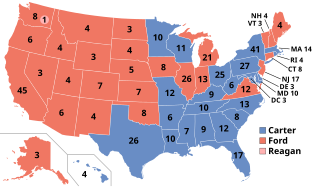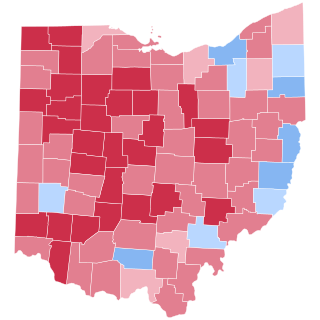
The 1976 United States presidential election was the 48th quadrennial presidential election, held on Tuesday, November 2, 1976. Democrat Jimmy Carter, former Governor of Georgia, defeated incumbent Republican president Gerald Ford in a narrow victory. This was the first presidential election since 1932 in which the incumbent was defeated.

The 1980 United States presidential election was the 49th quadrennial presidential election, held on Tuesday, November 4, 1980. The Republican ticket of Ronald Reagan and George H. W. Bush defeated incumbent Democratic president Jimmy Carter and incumbent vice president Walter Mondale in a landslide victory.

The 1984 United States presidential election was the 50th quadrennial presidential election held on Tuesday, November 6, 1984. Incumbent Republican president Ronald Reagan defeated Democratic former vice president Walter Mondale in a landslide victory.

Jesse Alexander Helms Jr. was an American politician. A leader in the conservative movement, he served as a senator from North Carolina from 1973 to 2003. As chairman of the Senate Foreign Relations Committee from 1995 to 2001, he had a major voice in foreign policy. Helms helped organize and fund the conservative resurgence in the 1970s, focusing on Ronald Reagan's quest for the White House as well as helping many local and regional candidates.

The 2008 United States presidential election was the 56th quadrennial presidential election, held on November 4, 2008. The Democratic ticket of Barack Obama, the junior senator from Illinois, and Joe Biden, the senior senator from Delaware, defeated the Republican ticket of John McCain, the senior senator from Arizona, and Sarah Palin, the governor of Alaska. Obama became the first African American to be elected to the presidency, as well as being only the third sitting United States senator elected president, joining Warren G. Harding and John F. Kennedy. Meanwhile, this was only the second successful all-senator ticket since the 1960 election and is the only election where both major party nominees were sitting senators. This was the first election since 1952 in which neither the incumbent president nor vice president was on the ballot.

The 1996 United States Senate elections were held on November 5, with the 33 seats of Class 2 contested in regular elections. Special elections were also held to fill vacancies. They coincided with the presidential election of the same year, in which Democrat Bill Clinton was re-elected president.

The 1984 United States Senate elections were held on November 6, with the 33 seats of Class 2 contested in regular elections. They coincided with the landslide re-election of President Ronald Reagan in the presidential election. In spite of the lopsided presidential race, Reagan's Republican Party suffered a net loss of two Senate seats to the Democrats, although it retained control of the Senate with a reduced 53-47 majority. Democrats defeated incumbents in Illinois and Iowa, and won an open seat in Tennessee, while Republicans defeated an incumbent in Kentucky.
Arthur Jay Finkelstein was a New York state-based Republican Party (GOP) consultant who worked for conservative and right-wing candidates in the United States, Canada, Israel, Central Europe, and Eastern Europe over four decades.

The 2008 United States Senate election in North Carolina was held on Tuesday, November 4, 2008. The Senate election coincided with the presidential, U.S. House elections, gubernatorial, Council of State, and statewide judicial elections. Incumbent Republican U.S. Senator Elizabeth Dole ran for re-election to a second term, but was defeated by Democrat Kay Hagan.

The 1984 United States presidential election in California took place on November 6, 1984, as part of the 1984 United States presidential election. State voters chose 47 representatives, or electors, to the Electoral College, who voted for president and vice president. California voted for the Republican incumbent and former California Governor, Ronald Reagan, in a landslide over the Democratic challenger, former Minnesota Senator and Vice President Walter Mondale. Reagan easily won his home state with a comfortable 16.24% margin and carried all but five counties. Despite this, California's margin was 1.97% more Democratic than the nation as a whole.

In 1980, Ronald Reagan and George H. W. Bush were elected president and vice president of the United States. They defeated the incumbent Democratic President Jimmy Carter and Vice President Walter Mondale.

The North Carolina United States Senate election of 1990 was held on November 6, 1990, as part of the nationwide elections to the Senate. The general election was fought between the Republican incumbent Jesse Helms and the Democratic nominee former Mayor of Charlotte Harvey Gantt. Helms won re-election to a fourth term by a slightly wider margin than the close election in 1984.

The 1976 United States presidential election in North Carolina took place on November 2, 1976, and was part of the 1976 United States presidential election. Voters chose 13 representatives, or electors to the Electoral College, who voted for president and vice president.

The 1984 North Carolina gubernatorial election was held on November 6, 1984. Democratic incumbent Jim Hunt was unable to run for another consecutive term under the North Carolina Constitution. Hunt ran instead for the U.S. Senate against Jesse Helms and lost, although he later announced his campaign for a third gubernatorial term in the 1992 election. Popular 9th District Congressman James G. Martin ran as the Republican nominee against Democratic Attorney General Rufus L. Edmisten, who defeated Hunt's Lt. Governor, James Green, among other candidates, in a hotly contested primary.

The 1984 United States elections was held on November 6, and elected the members of the 99th United States Congress. Republicans won a landslide victory in the presidential election, picked up seats in the House of Representatives, and successfully defended their Senate majority.

Gallup was the first polling organization to conduct accurate opinion polling for United States presidential elections. Gallup polling has often been accurate in predicting the outcome of presidential elections and the margin of victory for the winner. However, it missed some close elections: 1948, 1976 and 2004, the popular vote in 2000, and the likely-voter numbers in 2012. The month section in the tables represents the month in which the opinion poll was conducted. D represents the Democratic Party, and R represents the Republican Party. Third parties, such as the Dixiecrats and the Reform Party, were included in some polls.

The 1984 United States presidential election in Virginia took place on November 6, 1984. All 50 states and the District of Columbia, were part of the 1984 United States presidential election. Virginia voters chose 12 electors to the Electoral College, which selected the president and vice president of the United States.

The 1980 United States presidential election in Virginia took place on November 4, 1980. All 50 states and the District of Columbia, were part of the 1980 United States presidential election. Virginia voters chose twelve electors to the Electoral College, which selected the president and vice president of the United States.

The 1980 United States presidential election in Ohio took place on November 4, 1980. All 50 states and The District of Columbia were part of the 1980 United States presidential election. State voters chose 25 electors to the Electoral College, who voted for president and vice president.

President Ronald Reagan authorized the formation of his 1984 reelection campaign committee, Reagan-Bush '84, on October 17, 1983. He made the formal announcement of his candidacy for re-election on January 29, 1984. On August 23, 1984, he secured the nomination of the Republican Party at its convention in Dallas, Texas. The convention nominated Vice President George H. W. Bush as his running mate.


















